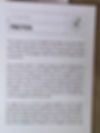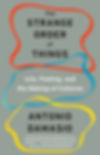
I bought a box of cards to define my inner weather a few years ago from School of Life, which toys with my propensity to live in my head. I need to get out of my head. But I digress. Here's one of the cards, which I swear I chose at random.

My initial thought was that I appreciate the cards and the way they help me think about what I'm feeling.
Did you catch that?
Think about what I'm feeling. Hmmmm. I think the problem here is one of semantics, or at least that's how I'm going to solve it. Emotions and feelings aren't the same thing. Antonio Damasio gets very, very granular about feelings and affect and mood. I think School of Life should have ditched the word emotions, as that confuses things. I think "I'm feeling practical" (see above pic) isn't really an emotion; there's nothing emotive about it for me.
In mindfulness, we talk about feeling tones (and Damasio's discussion of feelings is instructive here). Feeling tones are always with you and are at their core a vague sense of pleasant, unpleasant, or neutral. When we drop into our experience at any given moment—right now, for instance—we have a felt sense of either nothing, or of something pleasant or unpleasant. What's your feeling tone? What physical sensations are present? Where are they? And how strong are they? Would you describe yourself as in low arousal (of your nervous system) or high arousal?
So what?
We move through life under the illusion that things are objective and that we "see things as they are." In reality, we have all kinds of lenses and filters that affect what we see, and life is, as I have noted previously, "an interpretive feat" (we thank Jerome Bruner for that one). Your feeling tone can affect what you see and how you behave. It can affect what you say and the decisions you make. And you probably don't realize it. Like the noise in your system related to being in a rush or living with chronic pain or drinking too much caffeine, your feeling tone (which might also be wrapped in a blanket of noise), is often an invisible driver of what you see, think, and do. And it can be canary in the coalmine.
All of the tiny moments that bring disappointment or pain that we forge through because, well, they're tiny moments, affect us. Deeply. The way they come to us and what we do with them creates who we are—creates brains that predict how we will be affected.
"We suffer more from the little things than the big things."
We suffer more from the little things because the big things make us pay attention, which creates the opening for things to be different. The little things create the undercurrent of your life, though. How's your undercurrent?
There's still time to jump into Mindfulness-Based Stress Reduction and there are two spots remaining (it begins Wednesday).
And for you financial advisors, I've got Mindfulness for Financial Advisors, which I have affectionately been calling Humans Being Financial Advisors (the title of the Chapter 10)
And if you want to check out some guided meditations, there's a handful here.
May ease find you.
Mary
